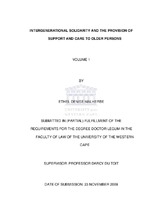Intergenerational solidarity and the provision of support and care to older persons
Abstract
This thesis deals with a very important issue in South African society, i.e. the provision of financial and non-cash support to older persons. Older persons in South Africa can be described as a sizeable but vulnerable group requiring specific protection. Section 27 of the South African Constitution of 1996 obliges the state to take reasonable legislative and other measures within available resources to progressively realise the right of access to social security. Hence, the steps taken by the state to promote older persons’ right of access to social security and to protect their right to dignity need to be evaluated. The legislative framework for the provision of financial and non-cash support to older persons currently is fragmented into various statutes dealing with retirement income, state grants to older persons and care and support services for older persons. Therefore, the current legislation lacks an integrated approach to the provision of support and care to older persons, as well as a central principle on which to base future legislation concerning older persons. One such principle that could potentially be adopted is intergenerational solidarity, which can be described as the solidarity between the active working-age population, as one generation, from which benefits flow to older persons as the other. This thesis evaluates whether intergenerational solidarity should form the basis of South African legislation on the provision of retirement income and the provision of care and support to older persons, and if so, whether it in fact does. If the answer to the latter is in the negative, the thesis further examines whether the current process to reform the retirement income system and related legislation in South Africa would be a suitable platform to introduce the concept of intergenerational solidarity to legislation concerning older persons.

